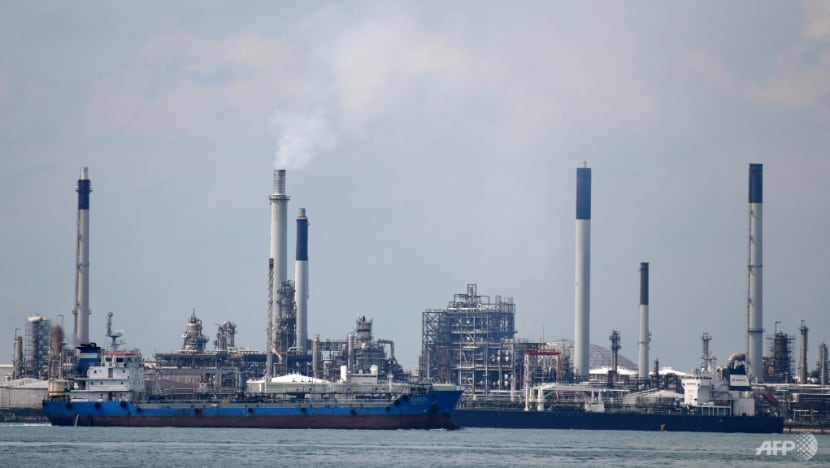Ministries, statutory boards to report sustainability efforts annually
From 2024, tender evaluations for large construction or ICT projects – both of which account for more than 60 per cent of the value of government procurement contracts awarded – will have a sustainability component.

File photo of a tanker vessel docked at Pulau Bukom off Singapore. (Photo: AFP/Roslan Rahman)
SINGAPORE: The Government will publish an annual report to detail its progress, efforts and plans in environmental sustainability starting in Financial Year 2023, Minister for Sustainability and the Environment Grace Fu told Parliament on Thursday (Mar 2).
The annual report comes under the GreenGov.SG initiative, which details how the public sector will lead the way in pursuing sustainable development.
Under GreenGov.SG, the Government has committed to achieve several sustainability targets by 2030, including for energy, water and waste, and to achieve net-zero emissions around 2045, five years ahead of the national target.
"We will start with reporting Scope 1 and 2 emissions, electricity, and water consumption, with reference to international standards and frameworks," said Ms Fu.
Scope 1 and 2 refer to the different kinds of emissions an entity creates in its operations. Scope 1 refers to direct emissions a company makes while Scope 2 refers to those made indirectly. There is also Scope 3, which involves emissions that the entity is indirectly responsible for.
All statutory boards will also publish annual environmental sustainability disclosures from FY2024, as part of a move to have the public sector lead the way with decarbonisation efforts.
A handful of statutory boards, namely the Monetary Authority of Singapore, the National Environment Agency, Singapore's national water agency PUB and Sentosa Development Corporation have already published sustainability disclosures.
"They have been systematically incorporating sustainability in their decision-making and risk management frameworks to achieve concrete sustainability outcomes," Ms Fu noted.
ENVIRONMENTAL SUSTAINABILITY CONSIDERATIONS
The Ministry of Sustainability and the Environment (MSE) said it hoped to encourage more companies to track, plan and disclose their environmental performance in the transition towards a greener economy.
From next year, the Government will also progressively introduce environmental sustainability considerations into its tender evaluation process, beginning with large construction tenders and information, communications and technology (ICT) tenders.
These two sectors account for more than 60 per cent of the value of government procurement contracts awarded.
Up to 5 per cent of the tender evaluation points will be set aside for environmental sustainability.
"Such projects include public infrastructure, industrial buildings, and office ICT equipment contracts. Using ICT as an example, in addition to the requirement of matching the best-in-class in energy efficiency, we may evaluate the efforts of the tenderers in reducing packaging, and carbon footprint of their operations, when we evaluate the tender bids," said Ms Fu.
More details will be announced when ready, she added.
Noting that greener goods and services may entail additional costs, Ms Fu said that as the demand for green products and services will grow, green procurement in the public sector will encourage suppliers to adopt sustainability practices and develop greener products and services.
This would enhance the growth of the green economy in Singapore, and the competitiveness of companies globally.
IMPROVING ENERGY EFFICIENCY IN MANUFACTURING
Smaller manufacturing companies can soon get financial support to adopt energy-efficient technologies under a government grant, added Ms Foo.
Launched in 2017, the Energy Efficiency Fund supports manufacturing firms, including small- and medium-size enterprises (SMEs), with annual group sales turnover of up to S$500 million.
From Apr 1 this year, pre-approved energy-efficient technologies will be eligible for a fixed 70 per cent support of qualifying costs, subject to a cap per facility.
Qualifying costs include external manpower, equipment or technology and professional services, according to a joint press release by the National Environment agency and the Ministry for Sustainability and the Environment.
Some examples of such technologies include the replacement of compressed air systems with air blowers and replacement of boilers with heat pumps.
As of January this year, the Energy Efficiency Fund has supported 44 energy-efficient projects involving LED lightings, high-efficiency air-conditioning systems, variable speed air compressors and boiler systems.
According to the National Environment Agency, these projects have achieved an estimated annual carbon abatement of about 2,000 tonnes, the equivalent of removing 700 cars from roads.















